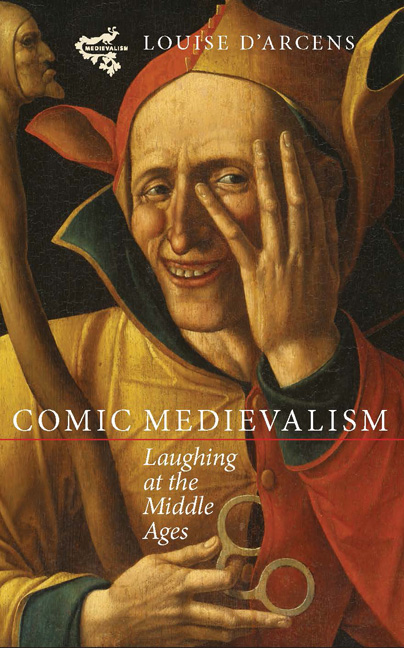Book contents
- Frontmatter
- Dedication
- Contents
- Illustrations
- Acknowledgements
- I THE SET UP
- II OLDIES BUT GOODIES: COMIC RECOVERY
- III HIT AND MYTH: PERFORMING AND PARODYING MEDIEVALISM
- IV THAT'S EDUTAINMENT: COMEDY AND HISTORY
- 6 ‘The Past is a Different and Fairly Disgusting Country’: The Middle Ages in Recent British ‘Jocumentary’
- 7 Smelling the Past: Medieval Heritage Tourism and the Phenomenology of Ironic Nostalgia
- Afterword: Laughing into the Future
- Bibliography
- Index
7 - Smelling the Past: Medieval Heritage Tourism and the Phenomenology of Ironic Nostalgia
from IV - THAT'S EDUTAINMENT: COMEDY AND HISTORY
Published online by Cambridge University Press: 05 November 2014
- Frontmatter
- Dedication
- Contents
- Illustrations
- Acknowledgements
- I THE SET UP
- II OLDIES BUT GOODIES: COMIC RECOVERY
- III HIT AND MYTH: PERFORMING AND PARODYING MEDIEVALISM
- IV THAT'S EDUTAINMENT: COMEDY AND HISTORY
- 6 ‘The Past is a Different and Fairly Disgusting Country’: The Middle Ages in Recent British ‘Jocumentary’
- 7 Smelling the Past: Medieval Heritage Tourism and the Phenomenology of Ironic Nostalgia
- Afterword: Laughing into the Future
- Bibliography
- Index
Summary
A question that has exercised numerous theorists of comedy, humour and laughter is what Simon Critchley has called ‘the ethos and ethnos’ of humour; that is, its reinforcement of cultural and ethnic distinctions through the ridicule of foreigners, minorities and other outsiders. But, as discussed in the previous chapter, by contrast almost nothing has been said about how received ideas about the present, and about modern Western personhood, are perpetuated by humorous representations of the pre-modern past and its people. It is perhaps unsurprising that this question has not detained these theorists, whose concern has generally been with the social implications of exclusionary and objectifying comedy taking place within a single temporal dimension cohabited by teller, audience and object. Unlike racist, sexist or homophobic jokes, historicist humour has not warranted their attention because its cross-temporality would seem to render it a victimless offence, with the long-dead of the Middle Ages both oblivious and invulnerable to the mirth they generate for us moderns. While this might be true, it leaves unaddressed what comic value the past, and the medieval past in particular, has for later societies. The previous chapter examined the particular difficulties of introducing comic content, interpretation and tone into televisual texts that otherwise purport to be ‘responsible’, even pedagogic, representations of the historical past.
- Type
- Chapter
- Information
- Comic MedievalismLaughing at the Middle Ages, pp. 161 - 180Publisher: Boydell & BrewerPrint publication year: 2014



